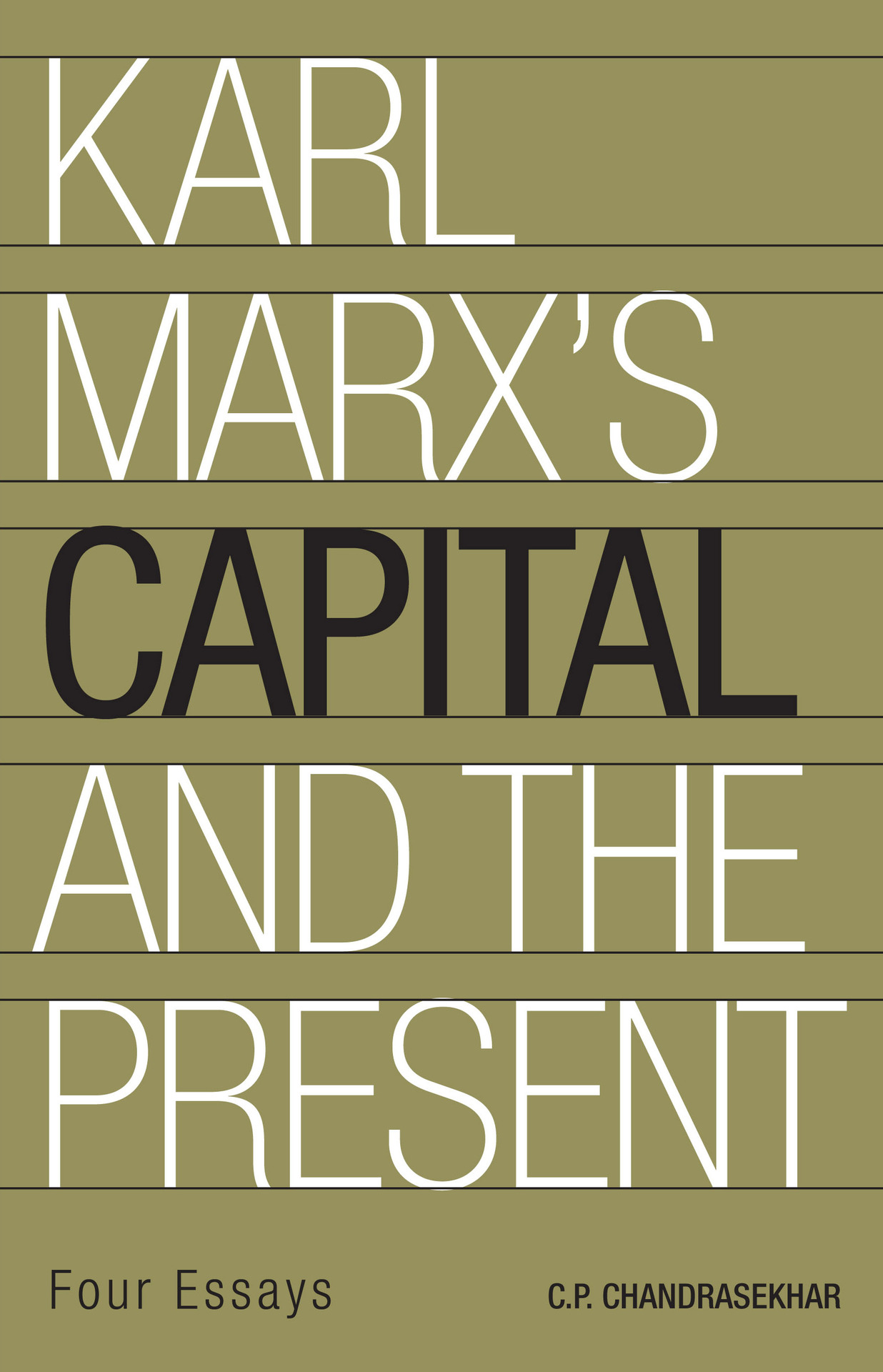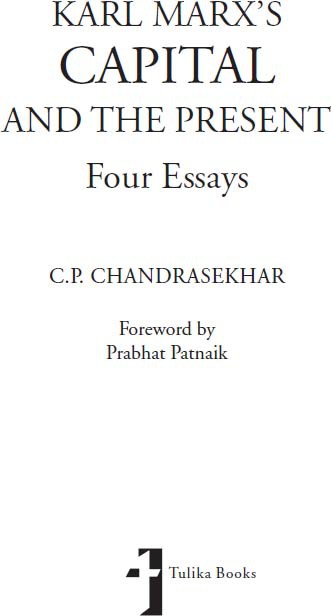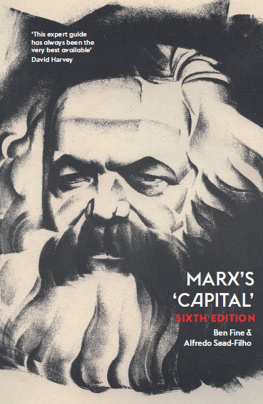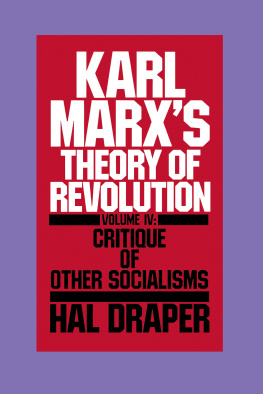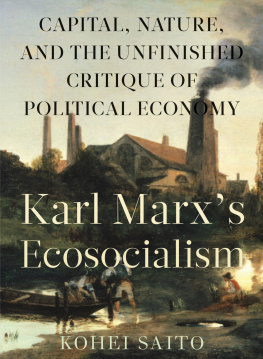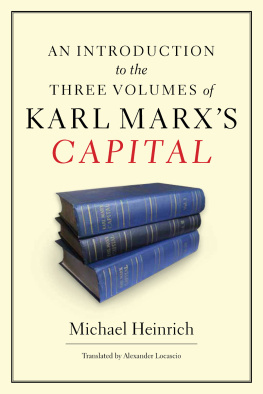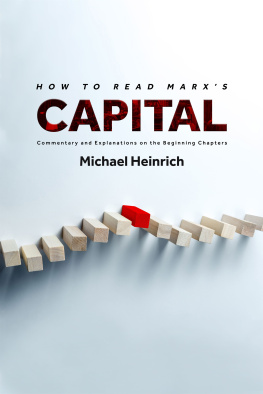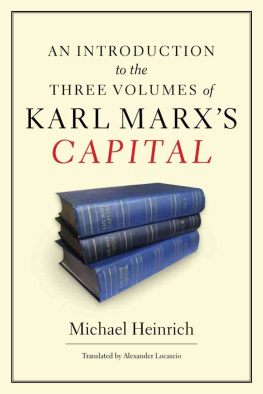Published by
Tulika Books
44 (first floor), Shahpur Jat, New Delhi 110 049, India
www.tulikabooks.in
C.P. Chandrasekhar 2017
First edition (hardback) 2017
Second edition (paperback) 2019
ISBN: 978-81-939269-9-4
Ebook 2020
Ebook ISBN: 978-81-945348-8-4
For
R AJEN
steadfast friend and guide
Contents
Marxism is famously said to have three sources and three component parts: classical German philosophy, French socialism, English classical political economy. While basing itself upon these three, however, it also at the same time decisively broke with each of them. But while its break with classical German philosophy has been much discussed, as indeed its break with French socialism, its break in the realm of political economy has scarcely received the attention it deserves. The fact that the renowned economist Paul Samuelson, admittedly not sympathetic to Marxism, could dismiss Marx as a minor post-Ricardian suggests a lack of awareness about the Ricardo-Marx, or rather the Smith-Ricardo-Marx, relationship that is quite staggering. And this in turn testifies to how little the matter has been discussed in the literature.
The tendency among non-Marxists has been to focus mainly on Marxs value-theoretic discussion, and to reinterpret Marxs prices of production in terms of Piero Sraffas analysis of equilibrium prices in his Production of Commodities by Means of Commodities. Since Sraffas work in this sphere has been taken as vindicating Ricardos approach to the determination of natural prices, the net result of this entire discussion has been to obliterate rather than underscore the distance between Marx and Ricardo. The issue of price determination has also absorbed much attention among Marxists themselves, who have correspondingly devoted less time than they should have to discussing the distance between Marx and his classical predecessors.
On this issue of distance, what Marx himself had said in his time continues more or less to be the basic position among most Marxists. According to Marx this distance, it may be recalled, lay in two inter-related areas: the perception of history and the theory of surplus value. There were, of course, important specific differences, such as on the possibility of generalized overproduction and on the theory of ground rent. But the tendency among most Marxists has been to believe that if we leave aside such differences on specific issues and focus only on the basic perspectival differences, then these two inter-related areas are the main point of demarcation.
This book, containing four lectures delivered by Professor C.P. Chandrasekhar under the auspices of Sahmat (Safdar Hashmi Memorial Trust) on the occasion of the 150 th anniversary of the publication of Das Kapital , assumes importance in this context: not only does the author discuss this issue of distance directly, but, by bringing the Marxist analysis of capitalism up to date and throwing light on the current era of finance capital, he implicitly emphasizes the rich potential of Marxism which sets it apart from classical political economy. The differences between Marx and classical political economy, as he notes, were far more profound; the distance travelled by Marx away from classical political economy was far greater than is commonly presumed. But before we come to that, let us recapitulate these two basic differences.
In The Poverty of Philosophy , Marx criticizes classical political economy for its perception that till now there has been history but henceforth there will be none i.e. for its perception of capitalism as the end of history; as an economic order in conformity with human nature, and with nature in general, for the achievement of which the entire preceding history had acted as a backdrop. There is here a remarkable parallel between this view of classical political economy and that of Hegelian philosophy, which also saw the climax of history in the arrival of the Prussian state. The concepts used by classical political economy, such as natural price, natural rate of profit and the like, are simply reminders of its position that the categories of capitalism are indeed natural categories, that this economic system is in conformity with nature.
Marx, in contrast, saw it as an exploitative system, just as slavery and feudalism before it had been. It was exploitative not in terms of any Lockean natural rights doctrine but on a par with other preceding modes of production in history, where a surplus was extracted from the direct producers by a class of non-producers. Far from representing the end of history, therefore, capitalism needed to be transcended if mankind had to proceed from what Marx called its pre-history, to which capitalism as an exploitative system also belonged, to its real history which it would make consciously through its praxis. History, in short, did not end with the beginning of capitalism; instead, history began with the end of capitalism.
The question before Marx, therefore, was how to unearth the manner of exploitation under capitalism when the relations in the capitalist marketplace were governed by voluntary contracts and there was an exchange of equivalents. And this led to his second basic difference from classical political economy, namely his theory of surplus value, which was part of the problematic rooted in his perspective on history. Classical political economy no doubt had occasionally shown a dim awareness of the fact of exploitation under capitalism, such as when Smith had advanced his deduction theory of profits, or Ricardo had seen profits as a surplus or (in De Quincys words) as the leavings of wages. But why such a surplus arose is a matter that was never pursued.
In fact the Malthusian theory of population, according to which the supply of labour adjusted to the demand for it at a subsistence wage so that any increase in wages above subsistence level created an excess supply of labour that drove wages down to subsistence, provided a readymade explanation for the existence of a surplus that came to capitalists. But this only suggested that the fact of the surplus coming to capitalists was the result of a failing on the part of the workers themselves , namely, their propensity to procreate excessively the moment they climbed out of a subsistence level of living. (Marx, not surprisingly, was to call the Malthusian theory of population a libel on the human race.)
The investigation into the mode of extraction of the surplus, which under capitalism took the form of surplus value, led Marx, as is well known, to his seminal discoveries: the distinction between labour and labour power; the identification of the sphere of production as the location where surplus value was generated; the two-fold nature of labour, abstract and concrete labour, corresponding to the two-fold nature of commodities, as exchange value and use value; the pervasive dualism that characterized all categories under capitalism, where a product was simultaneously a commodity, the labour process simultaneously a value-creating process, the surplus simultaneously surplus value; and so on. Chandrasekhar, in his first lecture, gives an extremely lucid account of these seminal discoveries of Marx.
Historicizing Ricardo, in short, did not mean just adding a historical sequel to capitalism, with which classical political economy thought that history had come to an end; nor did it mean offering just an ethical critique of the capitalist system, leaving its analysis as undertaken by Ricardo untouched (as the Ricardian socialists like Hodgkin had done). It meant a completely different analysis of capitalism , which in turn opened up new areas for investigation. How did labour power become a commodity? (Here Marx was inspired by, and turned upside down, a Smithian concept the original accumulation of capital to propound his own concept of the primitive accumulation of capital.) How are the social relations that create capital and wage labour reproduced over time? How does a surplus value continue to get extracted since the Malthusian theory of population does not hold? (Here Marx advanced one of his most insightful concepts, the reserve army of labour.) And so on. The reader gets a flavour of all this from Chandrasekhars book.

